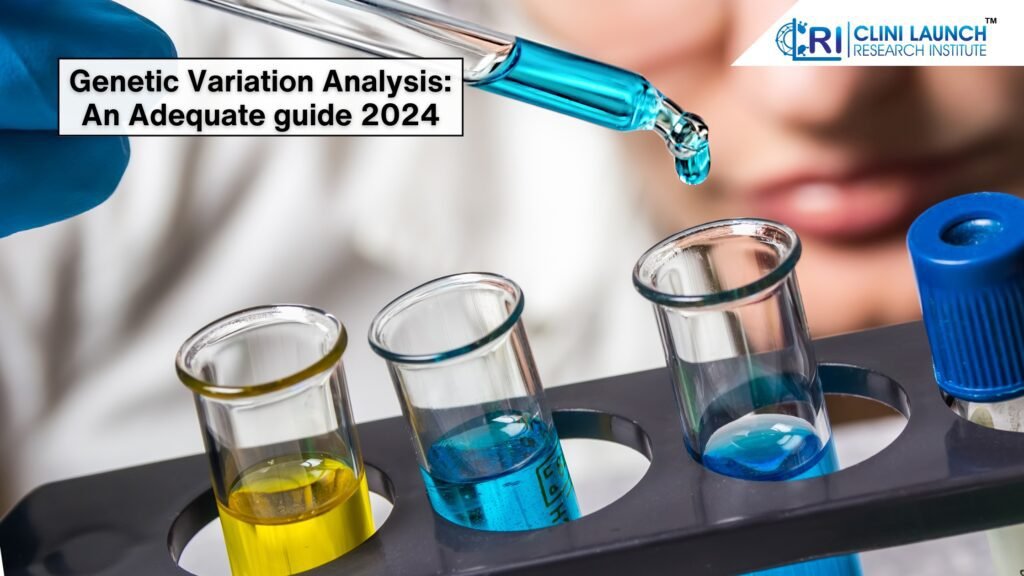Numerous genetic variation analysis is woven throughout the fabric of humanity. Every person is a distinct chapter in this elaborate tale, bearing the blueprint for their biological composition and the echoes of ancestral travels in their DNA.
Genetic Variation Analysis is the scientific exploration of these genetic threads, a quest to decipher the patterns and differences that define us as a species. Understanding population genetics – the study of genetic diversity within and between populations – is at the core of this field’s objectives. By studying the complexities of the human genome, scientists are learning a great deal about the evolutionary history of humans, migration patterns, and the genetic bases of both health and disease.
Want to learn more about genetics! Join bioinformatics program.Fundamentally, the goal of this field is to comprehend population genetics research, which is the study of genetic variation both within and between populations. Researchers are discovering a wealth of knowledge about human history, migration, and the genetic foundations of both health and sickness by examining the intricacies of the human genome.
Two potent approaches, demographic history analysis and genome-wide association studies (GWAS), are at the centre of this investigation. GWAS scans the entire genome to identify genetic variants associated with specific traits or diseases, offering a window into the genetic architecture of complex phenotypes. Population bottlenecks, admixture patterns, and migratory patterns are all revealed by demographic history analysis, which reconstructs the evolutionary history of populations. When combined, these instruments offer an all-encompassing structure for examining the complex connection between human variation and genetics.
The Complexity of Human Genetic Diversity and Population Genetics Research

There exists a significant level of genetic variation among human populations. Numerous morphological and physiological qualities, ranging from obvious features like eye color and hair color to more intricate features like illness susceptibility, are exhibited by this genetic diversity. A major obstacle in the field of population genetics research is figuring out the complex mechanisms that lead to this genetic variation.
The genetic variety seen in modern human populations has been greatly influenced by historical occurrences such as population bottlenecks, founder effects, and migrations. Furthermore, selection pressures from the environment – such as nutrition, climate, and disease exposure—have led to adaptations and additional genetic differentiation. It is still a difficult effort to correctly assess the contributions of these factors to genetic diversity due to their complicated interplay.
Anthropological classifications and phenotypic observations were frequently the foundation of traditional population genetics research methods. Although these techniques have yielded insightful results, it is clear that they fall short of fully capturing the range of genetic diversity. It is difficult to distinguish the purely genetic component of phenotypic features since they are influenced by both genetic and environmental variables. Moreover, these techniques frequently fail to take into account the finer points of genetic diversity within populations, which could result in erroneous or simplistic depictions of population structure.
On the other hand, genetic variation analysis provides a more accurate and thorough method of researching human populations. Researchers can uncover genetic variants linked to particular traits or disorders using methods like Genome-wide Association Studies, which offer important insights into the genetic makeup of complex phenotypes. Furthermore, population histories, including migration patterns, admixture events, and population size variations, can be reconstructed by demographic history analysis, providing insight into the evolutionary processes that have generated genetic diversity.
Through the integration of demographic history analysis and Genome-wide Association Studies with other population genetics research techniques, scientists can gain a more comprehensive understanding of the variables influencing genetic diversity in humans. Untangling the knots of human history, addressing global health inequities, and creating focused medical solutions all depend on this information.
Genetic Variation Analysis – Unlocking the Secrets of Human Genome
A key component of population genetics research is genetic variation analysis, which explores the complex web of variations in DNA sequence within and between populations. These differences, which include bigger structural variants and single nucleotide polymorphisms (SNPs), offer important new information about the demographic trends, illness susceptibility, and evolutionary history of human groups.
Analyzing genetic variation now uses genome-wide association studies (GWAS) as a key tool. Using genome-wide analysis of the relationships between genetic variants and certain traits or disorders, genome-wide association studies (GWAS) have completely changed our understanding of intricate genetic architectures. Through the use of this method, genetic loci associated with a wide range of human characteristics, including height, weight, and susceptibility to chronic diseases, have been identified. GWAS makes a substantial contribution to population genetics research by revealing the genetic foundations of these traits and shedding light on the intricate interactions between genetic and environmental factors.
Demographic history analysis provides an additional viewpoint on genetic diversity in addition to GWAS. This method offers vital context for evaluating genetic variation data by reconstructing the historical histories of populations, including migration patterns, population bottlenecks, and admixture events. Researchers can determine population links, calculate divergence periods, and pinpoint genomic regions that have been influenced by genetic drift or natural selection by analyzing genetic markers. These discoveries are critical to comprehending how genetic variation is distributed throughout communities and how it affects human health.
In the context of genetic analysis, the combination of GWAS and demographic history analysis has ushered in a new era of population genetics research discovery. Scientists can understand the intricate interactions between genetic, environmental, and historical factors that influence human variety and illness vulnerability by combining these methods. This information has enormous potential for creating focused preventative and therapeutic approaches, which would eventually enhance human health and well-being.
Uncovering the Benefits of Genetic Variation Analysis through GWAS

A fundamental component of modern population genetics research, genetic variation analysis provides deep insights into human health, history, and the potential for tailored medicine. Researchers can piece together the complex picture of demographic history analysis by carefully analyzing patterns of genetic variation within and between populations. This can provide light on events such as mixing, population expansions, and ancestral migrations.
Genome-wide Association Studies, which systematically scan the genome to uncover genetic variants related to particular traits or disorders, are a crucial tool in this attempt. Through the identification of these genetic markers, researchers can identify populations that are more susceptible to specific illnesses, allowing for the development of tailored disease preventive measures and early interventions. For instance, targeted screening and early therapeutic interventions have been made possible by the effective identification of genetic variants by GWAS that are associated with a higher risk of Alzheimer’s disease.
Moreover, genetic variation analysis holds enormous promise for utilizing tailored therapy to transform healthcare. Clinicians can more precisely adapt treatment strategies and preventive measures by deciphering each patient’s unique genetic blueprint. This change in perspective has the potential to maximize therapeutic efficacy while reducing side effects.
The integration of genetic analysis into clinical practice necessitates a very ethical framework that can safeguard the privacy of genetic information and mitigating the risk of genetic discrimination is paramount. Moreover, the complex interplay between genetic factors and environmental influences underscores the need for comprehensive research to fully elucidate the mechanisms underlying disease susceptibility and progression.
In conclusion, genetic variation analysis is a dynamic field with far-reaching implications for human health and well-being. By harnessing the power of population genetics research, GWAS, and demographic history analysis, scientists are unlocking the secrets encoded within our DNA, ultimately paving the way for a healthier future.
From Genome to Population Health – The Future of Genetic Variation Analysis

With technology advancing at a rapid pace, the field of genetic variation analysis is poised for revolutionary change. Rapid advancements in whole genome sequencing (WGS) are providing unparalleled resolution for examining the complex web of genetic diversity in humans. WGS gives scientists a comprehensive picture of the genome, enabling them to explore the intricacies of population genetics research and reveal subtle patterns of genetic variation that were previously hidden by conventional genotyping techniques. With demographic history analysis, this increased clarity holds great potential for deciphering the genetic basis of complicated diseases and solving historical puzzles.
The novel gene editing method CRISPR-Cas9 has proven to be an effective instrument for examining the functional implications of genetic diversity. Scientists can gain a faster knowledge of genetic variation analysis by directly examining the significance of individual variations in biological processes through precise manipulation of specific DNA sequences. With the ability to create disease resistance and create innovative therapeutic approaches catered to genetic variations, this technology opens new possibilities for human health and wellbeing.
To fully utilize these technological advances, strong research efforts and collaborative activities are required. To fully understand the complexity of genetic variation analysis, there must be a global commitment to exchanging data and expertise. Researchers can expedite the conversion of findings into practical therapeutic applications by cultivating interdisciplinary collaborations. Furthermore, the study of population genetics is essential for comprehending how genetic variation is distributed among various populations, developing public health policies, and resolving health inequalities.
Genetic variation analysis has a bright future ahead of it, one that could transform healthcare and our understanding of human history. We may discover the mysteries contained in our DNA and enhance the lives of future generations by utilizing the power of developing technologies and promoting global cooperation.
Conclusion
Our understanding of population genetics has been completely transformed by genetic variation analysis, which meticulously incorporates techniques like demographic history analysis and (GWAS). This field can provide priceless insights into better health, disease susceptibility, and human history. The potential for advances in public health initiatives and customized therapy is becoming more apparent as we learn more about the complexities of genetic diversity.
Empowering the journey in genetic variation analysis
Are you intrigued by the possibility that genetic variation analysis could reveal important information about human health and illness? Leading upskilling institutes like CliniLaunch provide in-depth training in clinical research and bioinformatics to help candidates and even professionals advance their careers in the healthcare industry.
Want to know more about our courses?
Visit CliniLaunch at https://clinilaunchresearch.in/courses/ to learn more.

Krishna Talreja
Dynamic content marketing professional with expertise in brand storytelling and strategic content creation. Adept at managing diverse content projects, driving engagement, and enhancing brand visibility across multiple platforms.






Your point of view caught my eye and was very interesting. Thanks. I have a question for you.
I found this blog post on genetic variation analysis to be
incredibly insightful and well-written. The field of genetic variation analysis is truly fascinating,
and it’s amazing to see how it can be used to uncover important information about human health and disease.
I’m particularly interested in the potential for
advances in public health initiatives and personalized medicine through genetic variation analysis.
As someone who is passionate about improving healthcare outcomes, I appreciate the potential impact this field could
have on our ability to better understand and treat complex
diseases.
Thank you for sharing this informative and thought-provoking post.
I look forward to learning more about this topic
and the potential it holds for improving human health.
Best regards,
Jurgen